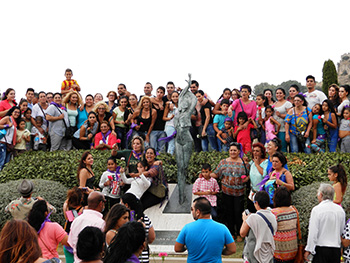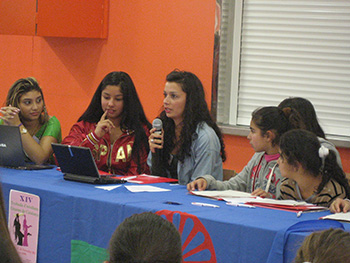 |
||
07.01.2014 The future of our people is in the hands of gypsy women | ||
The Unión Romaní has always said this. Thanks to gypsy women, our mothers and grandmothers, we survive today. They are those who have known how to conserve the fundamental aspects of our culture. If gypsy women had faltered in the past, if the persecution and disgrace that we have had to endure throughout centuries hadn’t been protected by our customs and traditions that these women represented, today our people would only be heard about in history books. But times change. Customs change. The “gadchés” of the 21st century aren’t like the ones from centuries ago. Technology has revolutionised everything. The internet, television, twitter, facebook, tablets, mobile phones, have created a new form of relations between human beings that has nothing to do with my youth, for example in my family, no one, absolutely no one, knew how to read or write. And our young gypsies aren’t alien to all of this. These “gadchés” are also citizens of the 21st century and know how to use, at least to some extent, the instruments that the majority of society use today. This phenomenon has confirmed what has been the essential doctrine of the Unión Romani for many years: Without the committed and active participation of gypsy women, the fight that gypsy men have undertaken is destined for failure.
At the beginning of this year, 2014, we were given a marvellous video recorded by five young girls, that are gypsy to the bone, as one of them says. I watched it paying close attention (unfortunately the background noise means it's not a great quality recording) and I was very impressed. Never have these gypsy women talked about "social programs", or "public aid” or “getting closer to political power to be in a photo” or “disputes between leaders” to know who best represents our community. These women, committed gypsies, haven’t ever said the word “association” that gypsy men like so much because thanks to “associations” we have some say in social and political life. They don’t need to seek refuge in any association to denounce the awful education system from which we suffer in Spain. They talk of interculturality, demanding that the system respects their identification as gypsies. They denounce the false image that we have been given lately, of an emerging youth that's restless and discontent suffering from a lack of opportunity. Patricia, Soraya, Pepi, Araceli and Gina have given us a breath of fresh air amidst rancid gypsy movement towards associative superstructures, every day more distant from traditional gypsy values and more concerned with money and power. But luckily Patricia, Soraya, Pepi, Araceli and Gina aren’t the only ones. To these names we could add a long list of gypsy women that whether inside or outside the system form part of the avant-guarde frontline in the great gypsy fight for the conquest of our rights. And if the gypsy women succeed and us men are able to recognise that they’re better prepared than us, so that together we can be the managers and administrators of our present, the future will be ours because with them we will have broken out of the oppressive chains of those that persecute us and of the conformity that keeps us silent for a plate of lentils.
Juan de Dios Ramírez-Heredia Lawyer and journalist President of the Unión Romani Click the following link to view the aforementioned video. Itís seven minutes long
This Spanish - English translation was done by the translator Robyn Emily Darbyshire for the PerMondo initiative that involves providing free translations for NGOs. PerMondo is sponsored and run by the translation agency Mondo Agit. |

